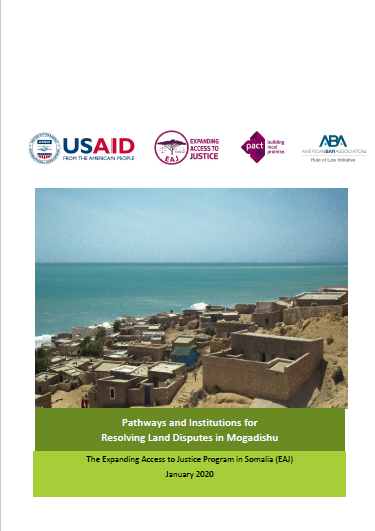Speeches Shim
One of the thematic areas selected as a result of the inception phase analysis of the United States Agency for International Development (USAID)-funded Expanding Access to Justice Program in Somalia (EAJ) was a focus on land disputes and grievances in Mogadishu. Disputes often start with the aggrieved parties addressing the elders in traditional institutions and may even end at the Supreme Court. However, at the same time, in the urban environment, elders often lack the mandate and power to resolve these issues and the judiciary plays a very small role in actually solving land disputes. Even where judgments are delivered, the police have shown little capacity to enforce them.
In order to inform its planned interventions with granular understanding of the origin and types of land conflicts and of the justice pathways aggrieved parties take, EAJ carried out research on access to land rights in Mogadishu. Key research questions concerned the historical background of Mogadishu and how historical population movements explain the depth and nature of some types of contemporary land grievances. In view of the present day land disputes, the research questions focused on the type of justice institutions available to justice seekers, the justice pathways people or groups of people take in order to seek solutions to their grievance, and what constituted vulnerability in the context of land disputes. EAJ aimed to understand the “user perspective” and elaborate on how people navigate different justice institutions and authorities and on the basis of what type of advice, information, or contextual factors users take their decisions to address a particular institution or authority. Such perspective promises a more comprehensive view of justice sector challenges, rather than only focusing on the performance of a selected justice system. The scope of findings follow and demonstrate how access to justice is a feature of power controlled by economic, social, and political networks.


Comment
Make a general inquiry or suggest an improvement.